4.3 Be A Poetry Sleuth
| Site: | Cowichan Valley School District - Moodle |
| Course: | ELA5, CSS, Sferrazza |
| Book: | 4.3 Be A Poetry Sleuth |
| Printed by: | Guest user |
| Date: | Tuesday, 23 December 2025, 5:57 PM |
Learning Targets
By the end of this lesson, you should be able to say YES to the following questions.
- Can I determine the meaning of unknown words and figurative language using context clues?
- Can I apply the skill of "close reading"?
- Can I reread and analyze poems to find evidence to support your responses?
- Can I identify features of poetry and describe rhyming patterns?

Close Reading - Sleuth Work
Good readers reread text to dig for evidence. They do close reading.
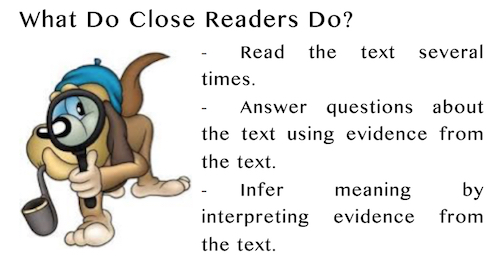
What Is A Sleuth?
A sleuth is a detective. You are a sleuth! Sherlock Holmes is a sleuth! Nancy Drew is a sleuth!
Here are some tips to unlock the "mysteries" of reading:
- Use clues called "context clues" to figure out the meaning of words.
- Use "context clues" to figure out the meaning of difficult phrases, including those that use figurative language (special descriptive phrases).
- Use evidence from the text to answer questions.
So, put on your detective hat and let's get started.


Here's a Hint...
What is a context clue? This video will give you a hint about context clues.
What is a Context Clue?
Context clues help you to discover what a word means.
Word detectives use the text around a word or phrase that lets you know what is happening and what the characters are saying and doing. This gives you clues about what an unknown word means.
Here are some sleuthing tips:
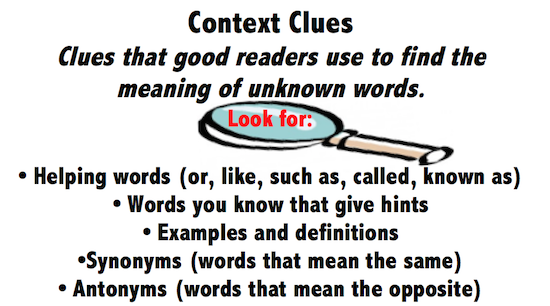
Example One
Can you figure out the meaning of the word dismal in the message below? Try to figure out the meaning. Then check below the phone to see if you were close.
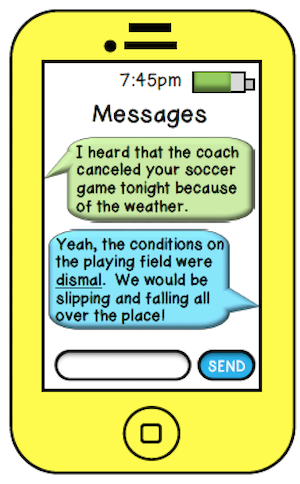
Obviously, the field was not in good shape. What could dismal mean? If you guessed a word similar to the ones below, you are a successful word sleuth already!
(Phone images from https://classroomgamenook.blogspot.ca/p/literacy-games_16.html)
Example Two
Here is another example. Can you figure out the meaning of the word perplexed? Think about it. Then, compare your idea to the ones below the phone picture.
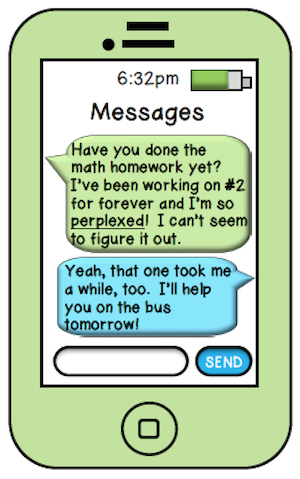
What could perplexed mean? If you guessed a word similar to the ones below, you are a successful word sleuth already!
Poetry Reading
You can use context clues to figure out the meanings of words and phrases in poems in the same way you saw how a context clue should have been used in the "ruptured" pop comic and the text messages. In lesson 4.2, you read that poetry reading was a skill? That often a poem was read more than one time? Here is what you learned in the last lesson:
Reading poetry is a skill. Poems are often read more than one time.
-
- First reading: Try to get the "gist" of the poem - a sense of what the poem is about and a sense of how it may be read.
-
- Second reading: This is usually a slower read, where you try to understand the poem better. (You completed this in the last lesson when you identified rhyming couplets and practised reading the poem out loud.)
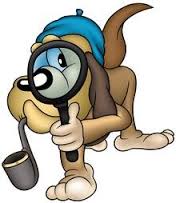
-
- Third+ reading: This reading may be to answer specific questions, to read it with deeper understanding, to read it more fluently and expressively, or to answer specific questions about the poem. Remember, good readers answer questions about the text using evidence from the text. You can be a sleuth by going back to the details in the text to find answers. (You are going to do this today!)
Context Clues in Casey at the Bat
Watch this video to see how to use clues in the text to infer the meaning of unknown words and phrases.
Your Turn!
In your Learning Guide, you will practise using close reading to interpret context clues so you can figure out the meaning of words and phrases in Casey at the Bat. Using context clues is skill you can use in all your reading work for ALL of your subjects. You can be a super word sleuth!



Reminder: Don't forget to do some independent poetry reading every couple of days and to add to your Poetry Reading Journal.